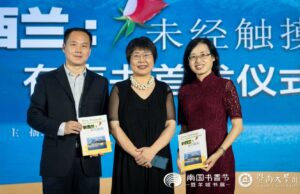ANNUAL GENERAL MEETING
Wednesday, 20 March 2013, at 5.45 pm
followed by
Dr Jian Yang MP
NZ-China Relations: Observations of an academic and politician
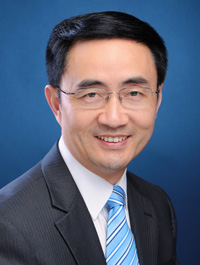 Dr Jian Yang received his PhD in International Relations from the Australian National University. He immigrated to New Zealand in 1999 and was elected as a National Member of Parliament in the general election held in November 2011. Before entering Parliament, Dr Yang lectured International Relations in the Department of Political Studies at the University of Auckland. He was also Associate Dean of the Arts Faculty at the University of Auckland, Director of China Studies Centre in New Zealand Asia Institute, Chairman of the Auckland branch of New Zealand Institute of International Affairs and a member of New Zealand National Council of CSCAP (Council of Security Cooperation in the Asia Pacific). His latest academic book is The Pacific Islands in China’s Grand Strategy: Small States, Big Games (New York: Palgrave Macmillan, 2011). Dr Yang currently sits on the Health Select Committee and Commerce Select Committee in Parliament.
Dr Jian Yang received his PhD in International Relations from the Australian National University. He immigrated to New Zealand in 1999 and was elected as a National Member of Parliament in the general election held in November 2011. Before entering Parliament, Dr Yang lectured International Relations in the Department of Political Studies at the University of Auckland. He was also Associate Dean of the Arts Faculty at the University of Auckland, Director of China Studies Centre in New Zealand Asia Institute, Chairman of the Auckland branch of New Zealand Institute of International Affairs and a member of New Zealand National Council of CSCAP (Council of Security Cooperation in the Asia Pacific). His latest academic book is The Pacific Islands in China’s Grand Strategy: Small States, Big Games (New York: Palgrave Macmillan, 2011). Dr Yang currently sits on the Health Select Committee and Commerce Select Committee in Parliament.
Dr Yang will talk to us about NZ-China relations from the two perspectives of academia and politics.
Connolly Hall, Guildford Terrace, off Hill Street, Thorndon, Wellington (see map)
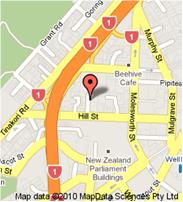
(Car park up Guildford Tce beside Hall)
An optional Chinese buffet meal, supplied by the Fujiyama Café, will follow the meeting at 7 pm. Orders for the $11.00 meal (please pay at the door) will be taken up till 6 pm. If you think you may be arriving late, please let the Secretary know in advance.
ALSO COMING UP THIS MONTH (see below for details)
2, 9, 16, 23 March, 3:15pm Mandarin Corner, 24 Kelburn Parade
28 March, 7:00pm Chinese Film, 101 Wakefield St
IDIOM OF THE MONTH (from Ellen Yang)
别开生面 bié kāi shēng miàn
be an eye-opener; break a new trail; break ground
NEW MEMBERS
A warm welcome to Graham & Priscilla Gibbs, Linda Pears, David & Monica Wanty and Mayor Celia Wade-Brown.
REPORT ON LAST MEETING, 2013 CHINESE NEW YEAR BANQUET (photo essay from Rosemary Jones)
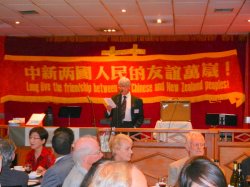
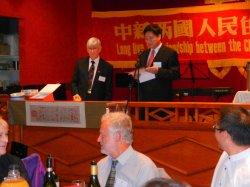
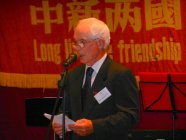
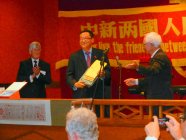
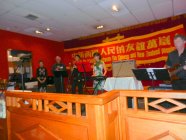
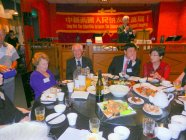
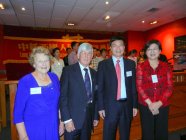
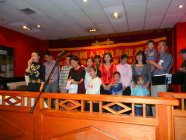
MEETING DATES FOR 2013
Your committee has organised the following meeting dates for 2013. Please mark these dates in your diary:
Wed 17 April, Wed 15 May, Sun 23 June, Sun 21 July, Wed 21 August, Wed 18 September, Wed 16 October, Wed 20 November. Note that the June meeting is on the 4th Sunday in June (rather than the 3rd Sunday).
NOTICE OF ANNUAL GENERAL MEETING – WEDNESDAY MARCH 20, 2013
This is the second notice for the Branch AGM which will be held on Wednesday, 20 March 2013 at 5.45pm at Connolly Hall. Nominations are invited for President, Vice President, Secretary, Treasurer and seven Committee members. Nomination forms are available with this issue of the Newsletter. Current officers and committee members who are prepared to serve for another year are: Ray Brownrigg, Rosemary Jones, Bing Fon, Luke Qin, Bruce Asher, Ellen Yang.
Members please consider standing for one of the elected positions. This is your society, but if we cannot find enough members to act as the committee, then the society must cease to function.
SUBSCRIPTION RENEWALS
Subscriptions for 2013 are now due. Please use the attached Banquet/Subscription form. We prefer that you fill in all the details on the subscription form each year to confirm that we have your correct details. Please note that from this year any subscriptions renewals not received by the end of April will result in cancellation of society membership. This is a result of a remit passed at the 2011 National Society AGM held in Wellington.
CONFUCIUS INSTITUTE NEWS (from the CIVUW team)
Xiao Ma Returns! Countertenor recital with piano accompaniment on Saturday 16 March, 3.00pm
Chinese countertenor, Xiao Ma, dazzled New Zealand audiences when he toured in early 2012. Now, a year later, he returns with a concert tour in Auckland, Hamilton and Wellington. Wellington audiences will have the opportunity to hear Xiao Ma’s extraordinary voice on Saturday 16 March in a vocal recital at the Ilott Theatre with piano accompaniment by Huang Yanjia. Xiao Ma’s seamless integration of chest and head voice, and rich music expressiveness, enables him to embrace a wide repertoire, from Baroque music, Western opera and German lieder, through to Chinese folk songs and pop songs. Tickets $30/S12 on sale at Ticketek: http://premier.ticketek.co.nz/shows/show.aspx?sh=XAIOMA13&v=WCC
Chinese Summer Camp: Call for Application
China is offering 100 places for New Zealand students to take part in a two week summer camp in China in July 2013 that includes a variety of language and cultural activities. The visit, which will see students stay in Beijing and one other city, will be from 10 July – 24 July 2013. 30 students will be selected from the Lower North Island (including Rotorua and the Bay of Plenty) by the CI at VUW. This camp is open to year 10 – 13 high school students who are NZ citizens or permanent residents, and non-native speakers of Mandarin with excellent academic records and a strong interest in China.
For further details, visit http://www.victoria.ac.nz/ci/news-events/news.aspx#Summer-camp2013
SPRING LIKES TO MOVE IT (by Luke Qin 秦瞳)
Not many if any transport systems in the world stand to be tested on a yearly basis of “moving heaven and earth”  proportion. The hundreds of thousands of wildebeests galloping across the vast African savannah in search of greener pasture can look no further than the Far East to find solace as they toil through this annual pilgrimage while having their tails snapped at by the same old warty crocs that you see on TV…
proportion. The hundreds of thousands of wildebeests galloping across the vast African savannah in search of greener pasture can look no further than the Far East to find solace as they toil through this annual pilgrimage while having their tails snapped at by the same old warty crocs that you see on TV…
That said, it’s good to know that the scalpers and unscrupulous websites that pick out newly released tickets, as they become available, at the speed of sound are being dealt with for a better public transport system charged with the unenviable task of having to deliver billions of people back to their loved ones wherever home is across the Middle Kingdom just before the Spring Festival.
In keeping with typical Chinese practicality and enterprise, inventions such as the “Ostrich pillow” as pictured have attained “legendary” status as it not only helps with the odd snooze but also provides perfect cover for watery eyes and frayed emotions as people farewell family members with the very best wishes for a better reunion.
The mind is willing, the tool is sharp, there really ain’t no mountain high enough…
MANDARIN CORNER 汉语角 3.15pm – 4.30pm Saturdays during school terms
Seminar Room, 20 Kelburn Parade, Victoria University of Wellington.
Open to all ages, all levels. One to one, or small groups.
Gold coin donation. 4 sessions in March 2013:
2 March – Celebrate Children’s day 庆祝儿童节 (Fun activities for children)
9 March – Chinese Cuisine – Dumpling Making and Tasting 中华美食系列 – 饺子
16 March – Pure Brightness/Tomb-sweeping Day 清明节
23 March – Neighbour’s Day 邻居日(远亲不如近邻)
Contact: Ellen Yang (04) 473-7558,[email protected]。
NZ CHINESE LANGUAGE ASSOCIATION AGM on April 18.
Please note that the AGM of the NZ Chinese Language Association will be held on Thursday April 18 in Committee Room One, Wellington City Council, 101 Wakefield Street starting at 7pm. Further details will be in next month’s newsletter.
CHINESE FILM 中国电影 Date: Thursday 28th March Time: 7.15pm
Venue: Committee Room One, Wellington City Council, 101 Wakefield Street. Gold coin donation.
7.15pm: Qiu Xi, 秋喜 [2009] 106 minutes
Director: 孙周Sun Zhou
Stars:郭晓冬 (Guo Xiaodong), 孙淳 (Sun Chun), 江一燕 (Jiang Yiyan), 秦海璐 (Qin Hailu)
Intriguing cat-and-mouse thriller between a KMT agent and CCP spy, this story was set on Guangzhou, Oct. 1949. The Nationalists are preparing to evacuate to Taiwan as Communist troops advance on the city.
<秋喜> 讲述了发生在1949年广州解放前夕的一段潜伏与反潜伏的传奇故事
Please note that there is no documentary this month and the feature film starts at 7:15pm.
With Support from Confucius Institute, Victoria University of Wellington. http://www.victoria.ac.nz/ci/
IN CHINA, MOST POLITICS IS LOCAL (from George Mills)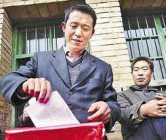
China watchers are fixated on whether the new leader, Xi Jinping, will be a reformer in the mode of Deng Xiaoping. Many hope that Xi will be as aggressive on political liberalization as Deng was on economic liberalization. But this focus on personalities may be misplaced, given the collective nature of China’s decision-making. More attention needs to be given to whether China’s unique form of regional decentralization — which triggered a remarkable economic transformation but discouraged political liberalization — can continue unchanged. Pressures for change are coming from the growing recognition that despite China’s remarkable material progress, the system is no longer equitable. This is reinforced by swelling complaints about how local officials deal with rising social consciousness, on display most recently in the protests over media censorship in southern China. China is unique in its reliance on a regionally decentralized system to deal with both economic and political objectives. Beijing provides the regions with the flexibility to experiment with economic reforms. Promotion and the rotation of senior provincial officials, who are appointed by Beijing, are linked to the ability to achieve targets set by the center. So, China’s regional leaders are more responsive to Beijing than to their local constituents. This same approach is applied to political objectives that are largely designed to maintain stability. Regional officials must deal with concerns that manifest themselves through local protests in ways that discourage the escalation of tensions. Protests have become the natural form of popular expression in China given the absence of direct elections and a strong civil society. These arrangements represent a form of “conditional autonomy” that allows provincial leaders to take whatever measures they feel appropriate to promote growth and maintain political stability as long as the legitimacy of the regime is not threatened. But this conditional autonomy is also fraught with risks since excessive force can lead to more violent collective actions, and concessions may encourage protesters to extract even more from the system. Thus some form of concession with repression is typically used to resolve disputes and discourage future incidents. This approach provides incentives for provincial leaders to perform, but also shields Beijing from blame if something goes wrong locally. Change is needed. The proposition that economic liberalization will give birth to political liberalization is an old one — and it has happened elsewhere. But China has been cautious. Can the new generation of senior leaders forge ahead with political liberalization in a way that is acceptable within the party system and does not jeopardize China’s hard-won economic success? In 1998, a law establishing more competitive village-level elections gave hope that the roots of change could begin at local levels. The nature of such elections, however, with their lack of openness and lack of independence from party interventions, was disappointing. But if these elections were truly representative, they could put officials in place who would be more responsive to the local populace, reducing the need for public protests, and making it less necessary to appeal to Beijing for intervention. Xi Jinping and China’s other new leaders don’t need to revolutionize the country’s leadership now. Real political change can start by moving forward with more representative local elections that will create pressures for accountability from the bottom up. This would need to be supported by a more balanced approach in dealing with social unrest that looks at more than just security considerations when handling grievances. All of this could be done while maintaining the supremacy of China’s one-party system — a precondition in today’s China. The possibility for a political opening in China lies with Xi’s willingness to make local leaders more accountable to their constituents and not only to Beijing. (NY Times, 29 Jan 2013, edited. By Yukon Huang, senior associate at the Carnegie Endowment for International Peace and a former World Bank country director for China.)



